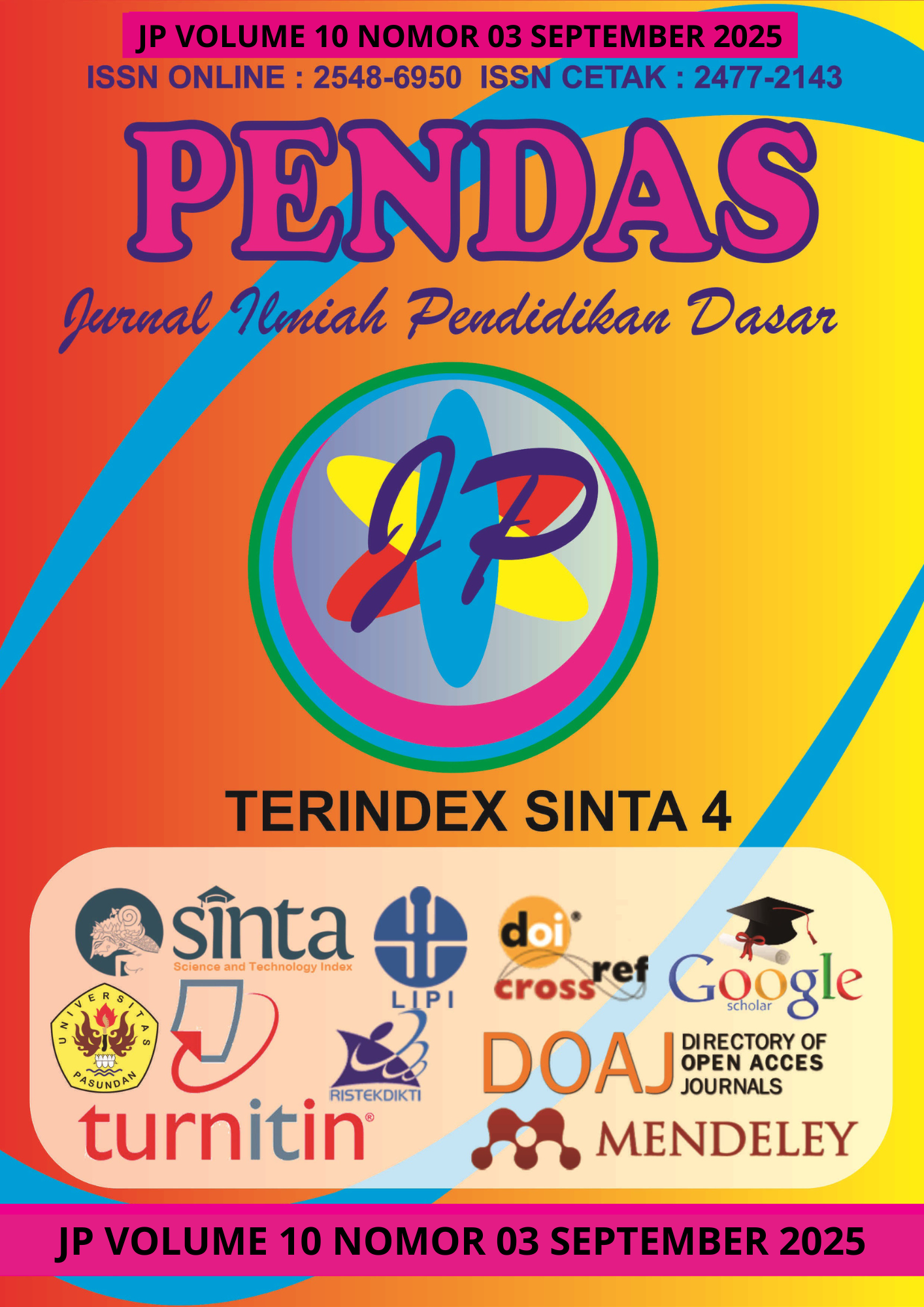KEMAMPUAN METAKOGNISI SEBAGAI SELF REGULATED LEARNING MAHASISWA PPKN FKIP UNIVERSITAS SRIWIJAYA UNTUK MENCAPAI PRESTASI BELAJAR
DOI:
https://doi.org/10.23969/jp.v10i03.33892Keywords:
Self regulated learning, metacognition, academic achievementAbstract
This study aims to determine the metacognitive ability as self-regulated learning of Pancasila and Citizenship Education (PPKn) students of the Faculty of Teacher Training and Education, Sriwijaya University to achieve academic achievement. This study uses a quantitative approach with a correlational method. This study involved 225 active PPKn students from the classes of 2022, 2023, and 2024. The research sample of 135 respondents was selected using a purposive sampling method. Supporting data consisted of documentation, questionnaires, and interviews. Based on data analysis, a Pearson correlation value of 0.899 was found, indicating that the correlation is included in the category of a very strong relationship. The results of the determination test showed an R² value of 0.808, indicating that 80.8% of learning outcomes are influenced by self-learning, while the remaining 19.2% are influenced by factors outside the study. and the t table value = 1.656. So 15.82 <1.656, which means H0 is rejected and Hα is accepted. Therefore, it can be concluded that there is a positive relationship between metacognitive abilities as part of self-regulated learning and student achievement. This indicates that the higher a student's metacognitive abilities, the higher their academic achievement. Conversely, if metacognitive abilities are low, student achievement tends to be lower.
Downloads
References
Abdelrahman, R. M. (2020). Metacognitive awareness and academic motivation and their impact on academic achievement of Ajman University students. Heliyon, 6(9),e04192.https://doi.org/10 1016/j.heliyon.2020.e04192
Azevedo, R., Bouchet, F., Duffy, M., Harley, J., Taub, M., Trevors, G., Cloude, E., Dever D., Wiedbusch, M., Wortha, F., & Cerezo, R. (2022). Lessons Learned and Future Directions of MetaTutor: Leveraging Multichannel Data to Scaffold Self RegulatedLearning With an Intelligent Tutoring System. Frontiers in Psychology, 13(June), 123. https://doi.org/10.3389/fpsyg. 02.813632
Azhar, R. (2022). Human Resources Development Efforts in Facing the Society 5.0 Era in Indonesia. Jhss (Journal of Humanities and Social Studies), 6(1), 076–080. https://doi.org/10.33751/jhss. 6i1.5335
Blackmore, C., Vitali, J., Ainscough, L., Langfield, T., & Colthorpe, K. (2021). A Review of Self-Regulated Learning and Self-Efficacy: The Key to Tertiary Transition in Science,Technology, Engineering and Mathematics (STEM). International Journal of Higher Education, 10(3), 169.https://doi.org/10.5430/ijh v1n3p169
Broadbent, J., Panadero, E., Lodge, J., & Fuller-Tyszkiewicz, M. (2022). The Self-Regulation for Learning Online (SRL-O) Questionnaire. Metacognition and Learning. https://doi.org/10.1007/s1140 -022-09319-6
Dörrenbächer-Ulrich, L., & Bregulla, M. (2024). The Relationship Between Self-Regulated Learning and Executive Functions—a Systematic Review. In Educational Psychology Review (Vol. 36, Issue 3). Springer US. https://doi.org/10.1007/s1064 -024-09932-8
Eriyani, E. (2020). Metacognition Awareness and Its Correlation with Academic Achievement of Educational Students. Indonesian Research Journal in Education|IRJE|, 4(1), 78 90.https://doi.org/10.22437/irj v4i1 8573
Fiandini, M., Nandiyanto, A. B. D., Al Husaeni, D. F., Al Husaeni, D. N., & Mushiban, M. (2024). How to Calculate Statistics for Significant Difference Test Using SPSS: Understanding Students Comprehension on the Concept of Steam Engines as Power Plant. Indonesian Journal of Science and Technology, 9(1), 45–108. https://doi.org/10.17509/ijost. 9i1.64035
Ge, W., Sun, Y., Wang, Z., Zheng, H., He, W., Wang, P., Zhu, Q., & Wang, B. (2025). SRLAgent: Enhancing Self-Regulated Learning Skills through Gamification and LL Assistance. In Proceedings of Preprint (Vol. 1, Issue 1).arXiv.http://arxiv.org/abs/2 06.09968
Hidayah, N. (2017). Psikologi pendidikan. Yogyakarta: Deepublish.
Ina, Y. V., Sawitri, N. K. A., & Raya, N. A. J. (2024). Hubungan Self Regulated Learning Dengan Prestasi Akademik Mahasiswa Keperawatan Fakultas Kedokteran Universitas Udayana Di Masa Pandemi Covid-19. Coping: Community of Publishing in Nursing, 12(3), 270.https://doi.org/10.24843/c ping.2024.v12.i03.p06
Pangestuti, D., & Suryanti, S. (2022). Hubungan Kesadaran Metakognitif dengan Hasil Belajar Biologi pada Siswa Kelas XI SMA. Jurnal Pendidikan dan Konseling,4(1), 6774.https://journal.universita pahlawan.ac.id/index.php/jpd article/view/6684
Sari, N., Sarassanti, Y., & Hasmy, A. (2024). Perbandingan Hasil Belajar Statistika Mahasiswa Berdasarkan Gender. Riemann: Research of Mathematics and Mathematics Education, 6(2), 44–52. https://doi.org/10.38114/5kwq d70
Schuster, C., Stebner, F., Leutner, D., & Wirth, J. (2020). Transfer of metacognitive skills in self-regulated learning: an experimental training study. Metacognition and Learning, 15(3), 455–477. https://doi.org/10.1007/s1140 -020-09237-5
Sugiyono, S. (2024). Metode Penelitian Kuantitatif, Kualitatif, dan R&D.Bandung: Alfabeta
Sugiyono, S. (2019). Metode penelitian kualitatif dan analisis data. Alfabeta.
Sugiyono, S. (2018). Metode penelitian pendidikan: Pendekatan kuantitatif, kualitatif, dan R&D. Alfabeta.
Syukri, M. (2023). Hubungan Kemampuan Metakognif , Self Regulated Learning, Motivasi Instrinsik Dengan Hasil Belajar Mahasiswa Program Studi Magister Admininstrasi Pendidikan Fkip Universitas Tanjungpura. Jurnal Visi Ilmu Pendidikan, 15(1), 74. https://doi.org/10.26418/jvip.v 5i1.59887
Undang-Undang Republik Indonesia Nomor 20 Tahun 2003 tentang Sistem Pendidikan Nasional. (2003). Lembaran Negara Republik Indonesia Tahun 2003 Nomor 78. https://peraturan.bpk.go.id/H me/Details/43920/uu-no-20 tahun-2003
Winne, H., P., & Azevedo, R. (2022). Metacognition and self regulated learning. Cambridge University Press
Downloads
Published
Issue
Section
License
Copyright (c) 2025 Pendas : Jurnal Ilmiah Pendidikan Dasar

This work is licensed under a Creative Commons Attribution 4.0 International License.














































